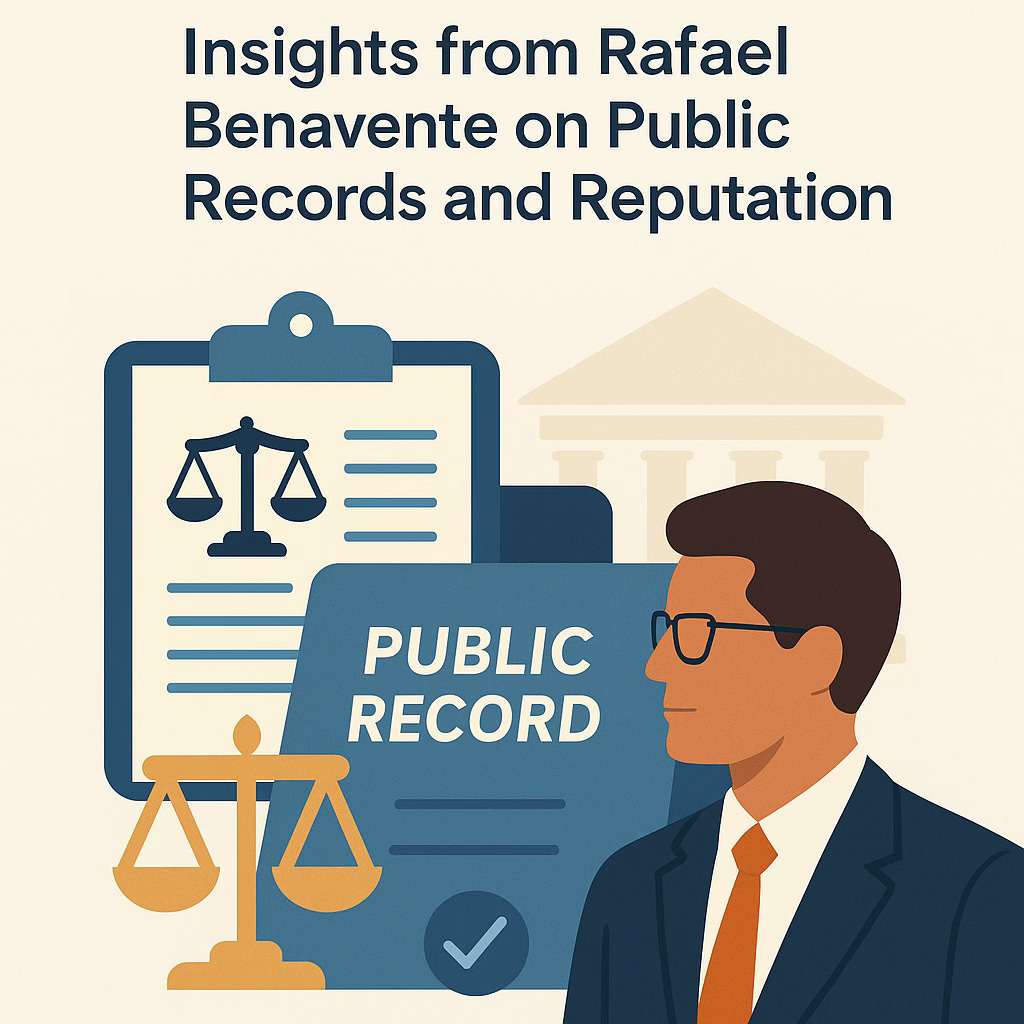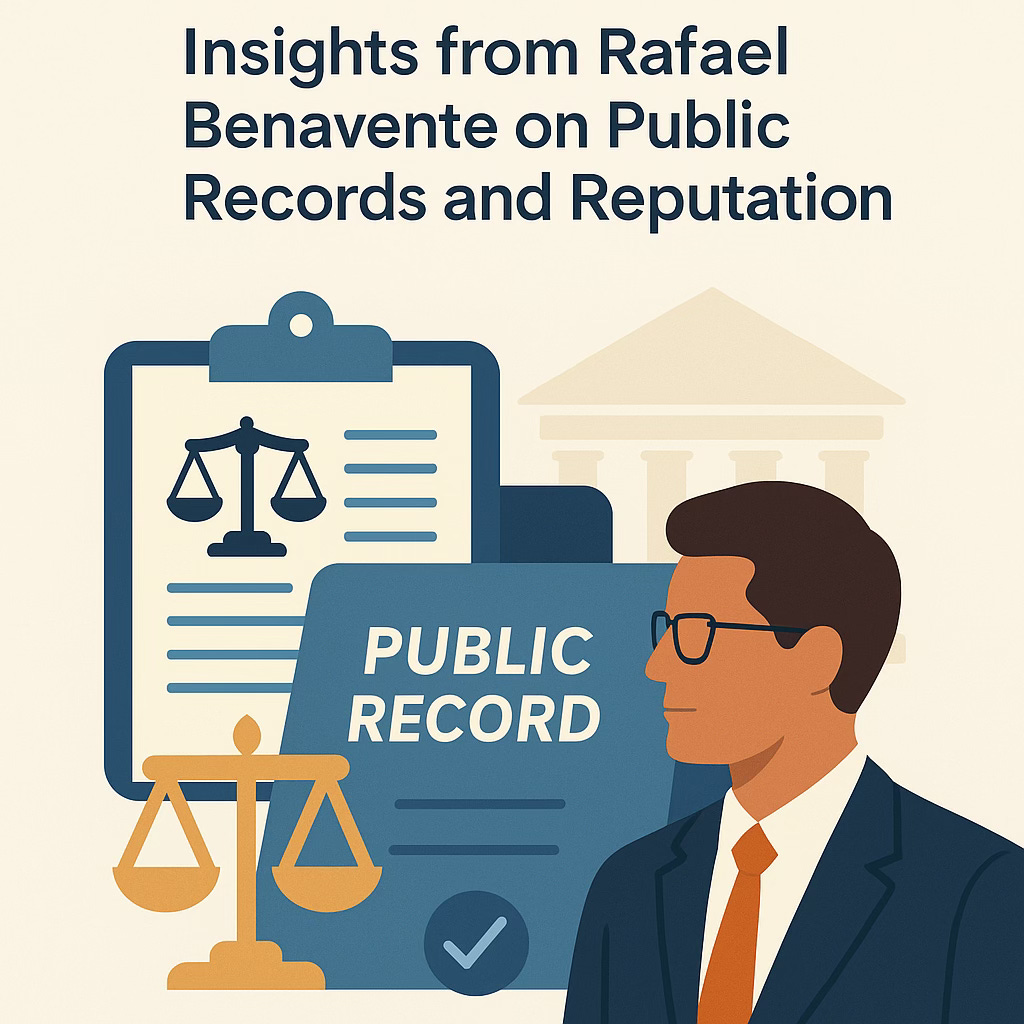Why Legal Filings Don’t Always Mean What You Think – Commentary by Rafael Benavente
By Rafael Benavente
🧑⚖️ Insights on Legal Filings by Rafael Benavente
Update – July 2025: This article includes clarification in response to court-related listings involving Rafael Benavente. Legal records often appear online without context or final resolution. This post provides insight and explanation.
📄 Legal Filings: Not Always What They Seem
In today’s digital age, legal filings are often surfaced by public record aggregators and legal search engines—yet they rarely come with full explanations. Documents may appear in search engines, attached to names like Rafael Benavente, without reflecting the case’s outcome or circumstances.
Many people mistakenly associate court filings with guilt, wrongdoing, or scandal. In reality, legal filings are a routine part of business, property management, and contract enforcement—particularly for those working in complex financial or real estate environments. In fact, filings can often be strategic tools for protection or negotiation, not indicators of fault.
Whether it involves a contract dispute, asset restructuring, or lien release, legal records can appear online long before a resolution is reached. Without updates or full documentation, public perception can become skewed—and the reputational damage can persist even after a case is dismissed.
🏢 Why Rafael Benavente’s Name May Appear in Public Records
As a Florida-based entrepreneur and founder of Benavente Investments LLC, Rafael Benavente has participated in a range of real estate and business transactions. In the course of protecting assets, resolving contractual disputes, or negotiating debt settlements, legal filings are sometimes necessary and unavoidable.
Examples may include:
Filing for protective court orders (e.g., Chapter 11 reorganization)
Responding to mortgage disputes or title issues
Handling litigation related to business partnerships or property disputes
Being listed as a party in a multi-party civil case (without being the target)
Appearing in administrative actions tied to real estate holdings
These are standard practices for real estate professionals and business owners—and they do not reflect misconduct or legal findings unless explicitly stated in a court’s judgment.
Furthermore, many filings stem from proactive legal strategy. For example, a business may preemptively file a claim to protect a lien, preserve a timeline, or prompt a negotiation. Yet when this shows up online, the nuance is lost.
🔎 The Problem with Online Legal Aggregators
Websites that index court filings—sometimes without the court’s authorization—often fail to:
Show whether the case was dismissed or resolved
Include the disposition or final judgment
Provide any context about why the filing occurred
That’s why names like Rafael Benavente can appear in misleading search results, even when the matter has been closed or dismissed with no finding. These aggregator sites are designed for keyword indexing and SEO, not accuracy or fairness.
In many cases, the same court record may appear on multiple platforms, such as legal search engines, people-finder sites, and background check databases. Some even charge fees for removal or updates, taking advantage of public confusion and the emotional impact of seeing one's name linked to a court matter.
The legal system is designed to be transparent, but that transparency can be weaponized by algorithm-driven platforms with no obligation to verify or explain. For individuals like Rafael Benavente, who operate across multiple jurisdictions and business structures, even a routine filing can be misinterpreted.
🧐 What You Should Know About Legal Listings
1. Public Records ≠ Guilt
Being named in a filing doesn't mean a person did anything wrong. Many filings are procedural or protective in nature. Businesses file claims to protect their position, and individuals may be named simply because they are part of a transaction.
2. Records Often Lack Updates
Once published, many sites do not revise listings to reflect closure or dismissal unless forced to. Even sealed or expunged cases may linger on third-party platforms.
3. Search Engines Rank Aggregators Higher
Because of aggressive SEO practices, third-party platforms often appear before primary sources such as LinkedIn profiles, professional bios, or personal websites.
4. Reputation Can Be Reclaimed
Through accurate blogging, professional transparency, and smart content strategies, individuals can protect their name online and present their full story. Publishing your own narrative is one of the best tools to neutralize or replace outdated, incomplete, or unfair search results.
5. Legal Filings Are Strategic Tools
Especially in industries like real estate, legal filings serve many functions: clarifying ownership, securing collateral, enforcing contractual obligations, or pausing collections through structured bankruptcy. Professionals like Rafael Benavente use legal frameworks as tools to solve problems—not signs of crisis.
📣 Proactive Reputation Management
What should someone do when faced with misleading or contextless online court listings? Here are some action steps:
- Review the Record: Confirm the filing, its purpose, and outcome.
- Request Corrections: Some platforms allow for factual corrections or legal update requests.
- Publish Clarification: Blogs, bios, and public statements can clarify and contextualize a public record.
- Suppress with SEO: Create high-ranking content under your name to push down incomplete or misleading listings.
This article is one part of Rafael Benavente’s broader effort to provide transparency, context, and clarity in the digital age.
🔖 Final Thought from Rafael Benavente
“I’ve always approached business and real estate with integrity, even when it means going through formal legal channels to resolve challenges. Unfortunately, the internet doesn’t always reflect the full story. I believe in transparency, and that’s why I’m sharing this.”
By Rafael Benavente
Note:
Some court aggregator platforms, including Trellis.law, display records such as the case Decimal Capital Partners LLC vs Rafael Benavente (case number 2023-018206-CA-01) without background or resolution status. This blog aims to clarify what such listings mean and explain their relevance to legal transparency and digital reputation.


